
Essential Time Management Tips
Time management is a skill most common in business circles. Entrepreneurs, realtors, financial analysts, project managers, party planners, professors, among others, depend on this must-have skill to make the most of their efforts. The truth is that knowing how to make the best use of your time is beneficial for everyone, since, let’s face it, 24 hours a day is never enough. What with deadlines, meetings, responsibilities, putting out fires, and everything in between, it’s no wonder time tracking apps are gaining popularity.
Since you can’t actually get more time, managing it in a way that best serves your needs is the next best thing. Time management drives and eventually determines career paths, successes, failures, and ultimately happiness. Time is truly your greatest currency, and when best used, the sky’s the limit.
Working smarter, being more focused, discovering new interests, continuing to learn…, those are all fortunate byproducts of time management skills. These can come in handy across all walks of life: at work, at home, at school, and even socially. After all, don’t we all want the chance to thrive and live our best life?

Why is Time Management So Important?
Time has a way of getting away from us. But for those who’ve mastered how to manage it, they can do a lot more with their week. Some work out at 5 am, some focus on calendar management, some delegate to their team members, while others have scheduled times for emailing. When you have efficiency and productivity on your side, you can indulge in personal growth, explore other interests, and acquire knowledge and experience that can help uncover bigger business opportunities.
Effectiveness, organizational know-how, productivity and prioritization are at the heart of good time management. Everyone has different ways to “make the most of their time.” Some even consider good time management their favorite life hack. One of Marcus’ favorite ways to manage his time is by using a “knockout list”. Each morning, he starts with a fresh notecard and makes a list of the five essential tasks he wants to complete that day and without exception, works to get them done.

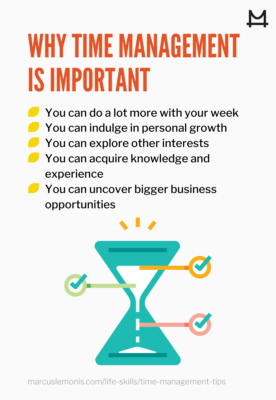
4 Disadvantages to Having Bad Time Management Skills
1. Elusive Purpose
Managing your time well means using hours in the day to best accomplish the goals you’ve set for yourself. Whether it’s a simple objective like hitting a deadline or needs more long-term planning like owning your own business one day, poor time management can hinder your future.

2. Lack of Motivation
Without properly laid out goals, there’s no single-mindedness or motivation, since your purpose is vague. Having the big picture in mind, and knowing what you want is crucial. If it’s just a set of tasks or an abstract idea of what’s next, you’re missing out. Quite literally! Wasting time, when you should be making the most of it. As Marcus says, “You gotta pick a path. And you gotta GO!”
And if you think money is the end goal, think again. Compensation is just one part of the equation. In fact, a Hubspot study shows that 40% of entrepreneurs start their business to make a difference in the world. Just as Marcus has said, “If you don’t have emotion and you don’t have passion, then you shouldn’t be in business, because money is a byproduct, not the purpose.”
3. More Procrastination
Leaving everything up to the last minute is no way to achieve your goals. It just leads to more stress and anxiety. Putting off things can even lead to physical discomforts, such as headaches, tension and stomach pain.
4. Easily Distracted
Let’s face it, there’s always going to be something else competing for your attention. From phone calls to text messages, from an impromptu study group to an extra shift at the local fast food joint, chit-chat by the water cooler to social media updates and so much more. Poor time management leads to less focus on your tasks, and more on multitasking.
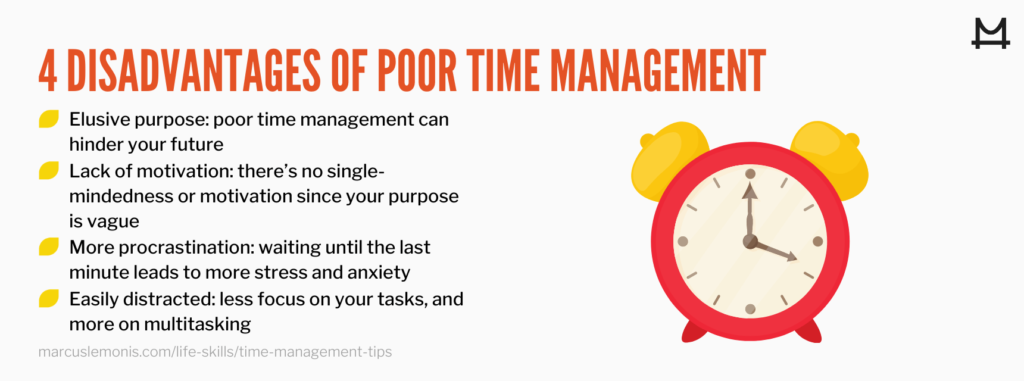
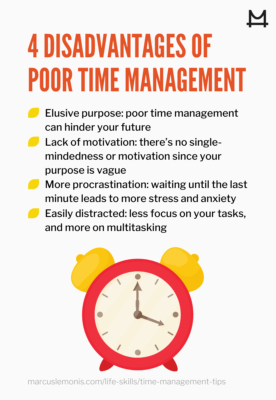
4 Benefits of Good Time Management Skills
1. Executing Ideas and Prioritization
Everyone has ideas, but very few are able to bring them to life because they can’t prioritize what they want to explore. Contrary to popular belief, execution has more to do with eliminating tasks for yourself and avoiding others altogether. What can be done at a later time? What can be completely eliminated? What can you delegate? Time management skills can help you figure out what to prioritize and in turn implement.
2. Being Self-Aware
Time management allows you to get to know yourself a little better, helping you uncover patterns that can help you maximize efforts. In time, you may notice you work better during certain times of the day. Or that you do your best research in the afternoon. Or you’re more engaged in class participation during night time courses.
Being more self-aware is just about paying a little more attention to yourself, being more observant, and some trial-and-error here and there. Eventually, you’ll find out how to work in the best way that suits your needs and reduce resistance along the way… and do more with your time.

3. Having Less Stress
If you have scheduled times blocked out for specific activities or tasks, you’ll have an easier time handling stress. The key is to give yourself enough time for each one so that you don’t set yourself up for failure. Be realistic with your objectives, timeframes, and don’t forget to include others’ responsibilities because they may impact your deadline. In addition, clear directions and deliverables help manage a team’s expectation further relieving stress.
4. Be More Organized
When everything is in its place, you’re not wasting time looking for anything and you can enjoy a sense of more self control. How long are you fishing through emails for a particular document? Or sifting through piles of paperwork to find a lost invoice? When you regularly record and store information, you can retrieve details at the drop of hat. This opens up your schedule for more productivity and opportunity.
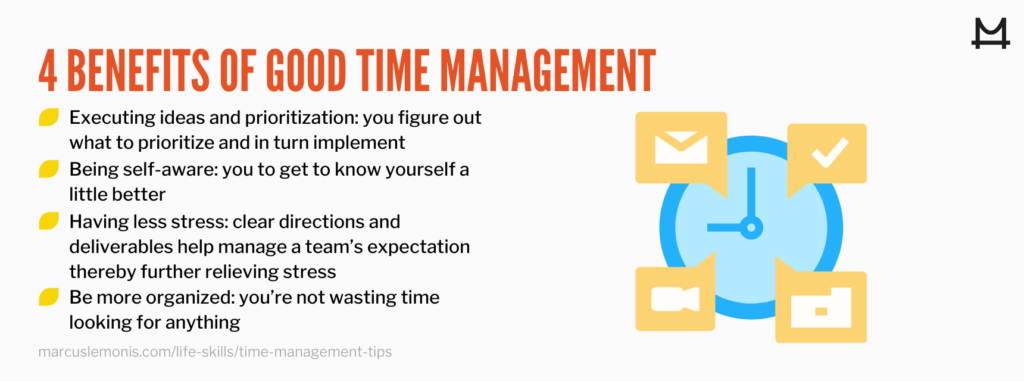
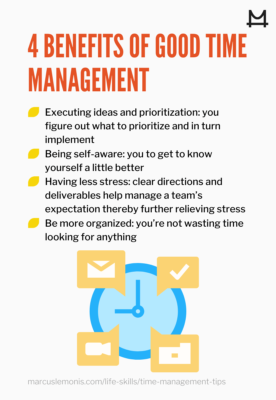
4 Tips to Manage Your Time Better
1. Communicate Better
Just imagine the wasted hours of productivity that take place when a team isn’t on the same page: the back and forth, the misunderstandings, the disagreements, the negotiations and hassles of just getting started. Now think about how smoothly it can all go when expression is timely, honest and clear.
2. Build Better Relationships
You’ve heard “there’s no I in team!” before. Working together effectively is one of the most subtle time management skills. Genuine collaboration can help you make the best use of your time, encouraging others to join you in your project, mission or even cause. It’s the easiest way to get people to jump on board, and have them invest in your efforts.

3. Learn to Delegate and Trust
The old adage “If you want something done right, do it yourself” isn’t always the best advice. It doesn’t matter the size of your business or project, no company, organization or even worthy endeavor is realized alone, in a silo. You need people. When you learn to let go, you can play to your employees’ strengths. That’s why you hired them in the first place! You can certainly provide direction and even detailed instructions on how you want things precisely done but you need to delegate so you can focus more on big-picture strategies such as where the company is headed, how to minimize cost, how to grow sales and so on.
4. Create an Optimal Working Environment
Allocate an area that’s only used for work. Nothing else. At home, in the office, wherever you are, have an environment that’s conducive to work, and only work. For longer periods of productivity. You may have to get a bigger computer monitor, noise-canceling headphones, better lighting, a desk heater, or other accessories to really have optimal working conditions.
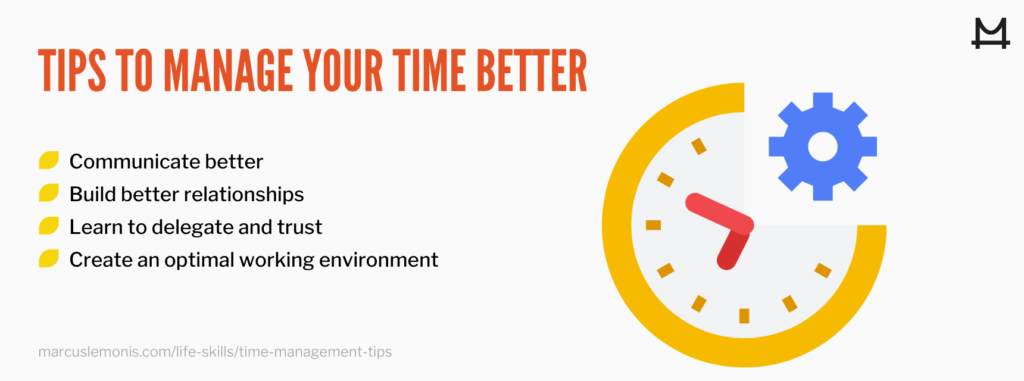
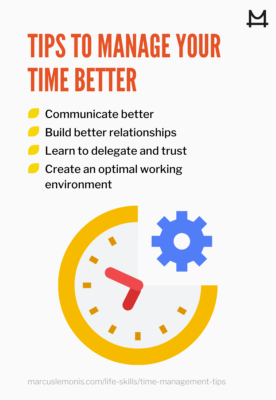
Learning to better manage your time is a crucial skill to have. Changing habits and implementing new skills won’t happen overnight. But practicing good time management skills can positively impact every facet of your life and ultimately help lead you on the road to success.
- What are some things you do currently to manage your time?
- What are some tips from above that you plan to use moving forward?





